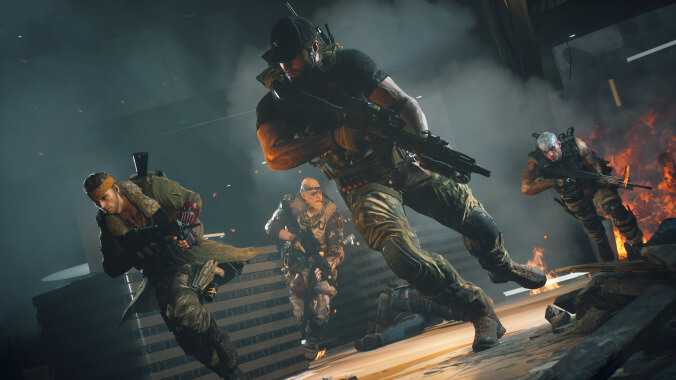Crossfire X Image: Smilegate/Remedy Entertainment
Every Friday, A.V. Club staffers kick off our weekly open thread for the discussion of gaming plans and recent gaming glories. But of course, the real action is down in the comments, where we invite you to answer our eternal question: What Are You Playing This Weekend?
Finnish game developer Remedy Entertainment has pretty much always been a studio built to be loved. Its first big hits were the
Max Payne games, which were the first games post-
The Matrix to really make “bullet time” a cool and integral part of the experience. Years later, the studio put out the excellent
Alan Wake, an extended Stephen King homage that might as well be the definitive example of a cult classic video game. The studio’s next major release was
Quantum Break, a somewhat bizarre action game with cool time-bending mechanics that boldly told its story through full-length live-action television episodes.
After that was Control, a game I can’t possibly say enough good things about, and one of Remedy’s next big games will be a long-awaited sequel to Alan Wake. But Remedy actually released a new game earlier this year, and in a bizarre twist after decades of hits—or, if not outright successes, then at least video games with a big fan following—nobody really noticed.
And there’s a pretty obvious reason for that, too: The game is a new single-player mode for Crossfire X, a free-to-play shooter made by South Korean studio Smilegate that is apparently very popular in Asia and not at all popular in the West. I haven’t put a ton of time into the free multiplayer version of Crossfire X, but I can say with some confidence that it’s awful. You won’t find much of anything in Crossfire X that you can’t also find in other, better shooter games like Counter Strike, Call Of Duty, or even Goldeneye 007.
So, as a fan of Remedy’s work, I was somewhat perversely curious to see just how bad its take on a bad shooter game would be. Having finished the two mini-campaigns available for Crossfire X, “Operation Catalyst” and “Operation Spectre,” I am surprised to say that they are only medium-bad—but in a way that gives me more confidence than ever in Remedy’s ability to consistently deliver.
Despite some big talk about being inspired by Metal Gear Solid and Resident Evil (two franchises that always deliver some sweet zaniness), the two campaigns are mostly straightforward soldier bullshit, but with at least enough fantastical nonsense to avoid any comparisons to real current events. There are two competing private military organizations in its world, Global Risk and Blacklist, one of which is sort of mainstream and the other is composed of ruthless “terrorists.”
You play as Global Risk and fight Blacklist in the first campaign, and then switch for the second, following a storyline about a Global Risk soldier who gets hooked up to some kind of machine that shows him a future world where a Blacklist soldier gets a super-suit and becomes an unstoppable murder machine. Or something like that. Until you actually become that murder machine—which is not as much fun as it should be—all that really matters is some guys shoot at you and you have to shoot back at them.
Bizarrely, the somehow stiff-yet-squirrelly shooting in the multiplayer mode feels more refined in single-player, probably because Remedy grafted Crossfire onto its existing tech rather than reusing what Smilegate had made, resulting in a game that’s actually does a fine job capturing the hard-to-define feel of good shooters like Call Of Duty. Being “playable” is a low bar to cross, but the single-player mode crosses it nonetheless.
The thing about Remedy’s work on Crossfire X is that there are little moments of cleverness or quirkiness that make it clear that it was made by a studio with artistic ambitions, rather than just a mercenary job. For example, you have a Max Payne-esque ability that slows things down, and Remedy chose to hilariously ramp up the effect of every gunshot, bullet impact, and explosion when this mode is activated, creating absurd showers of sparks with enemy bodies flying through the air in impossible ways. There’s not a reason for any of that to happen; it’s just goofy, and it makes the game seem more fun than it is—and call me a sucker, but it works.
A handful of moments also embrace the trippy architecture and visuals of Remedy’s Control, with looping hallways and rooms that impossibly extend out into infinity. There’s even an inexplicable cameo from a live-action actor, a lovably silly hallmark of Remedy’s games. I was disappointed that I didn’t run into an unnecessarily elaborate musical sequence soundtracked by Finnish rock band Poets Of The Fall (as seen in Alan Wake and Control), or a universe-shattering Easter egg referencing other Remedy titles, but they’ve gotta save the best tropes for real games.
To me, Crossfire X is like putting a really good driver in a crummy race car. Remedy has proven that it can have success with its weirdo original games, but rather than crashing and burning when handed someone else’s weirdo game, the studio managed to get the ugly, lurching monstrosity across the finish line anyway. The studio is simply that good. Now, can we please get it back to those weirdo original games?













![HBO teases new Euphoria, Larry David, and much more in 2026 sizzle reel [Updated]](https://img.pastemagazine.com/wp-content/avuploads/2025/12/12100344/MixCollage-12-Dec-2025-09-56-AM-9137.jpg)



























